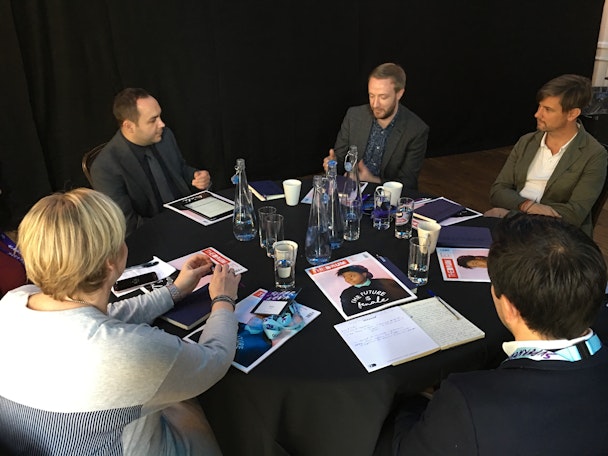Technology and creativity can help each other rediscover the passion in the ad industry
After a year of tough headlines generated by both creative and tech-driven shortcomings, the advertising industry has an opportunity to start a new chapter if these two elements can work together. That’s according to attendees at a recent roundtable event chaired by The Drum in association with Quantcast.

Roundtable discussion on 'Falling back in love with advertising'
The world cringed when model Kendall Jenner handed a good-looking policeman a can of Pepsi in the soft drink manufacturer’s ill-conceived ad from earlier this year. More recently, personal care brand Dove was forced to apologise for “missing the mark” when it took down its ad featuring colour-changing models using its skin care lotion.
Creative ideas that miss the mark are not a new phenomenon. The challenges faced on the media side of advertising are a less well-trodden territory. Most notably, a Times story in February 2017 revealed that digital advertising from household-name brands was appearing alongside inappropriate content. Although brand safety has always been an industry challenge, this moment proved a watershed for the industry.
With all these headlines, it is no surprise that some are questioning their love for the industry, and books like Bob Hoffman’s Bad Men are gathering attention. Advertising seems to have lost a bit of it’s charm. So what went wrong, and can creativity and emerging technologies like AI come together to help marketers - and consumers - fall back in love with advertising?
“The industry has let technology take precedence over goals,” argues Ben Murphy, UK MD at Quantcast. “We are measuring everything we do just because technology is allowing us to. The technology should be freeing up more space for us to actually think about what influences consumers.”
But getting the technology-creativity balance is tricky. A report by BlueVenn found that 51% of UK and US marketers feel they spend too much time analysing data, taking away time from the creative aspects of their job. And while 90% understand the data collected, the same percentage say effective data analysis is impossible without the right skillset.
For Nic Travis, senior vice president and head of digital marketing at MBNA, the advertising industry needs to wake up to the fact that it’s not in the Mad Men era anymore. During that period, TV was the only medium marketers needed to concern themselves with. By 2019, mobile is set to account for 72% of US digital ad spend.
“The modern marketer needs a different skillset. While data is important, we can’t forget the importance of creative. The display ad is not exciting, and the industry needs to think about how to utilise formats to be creative,” he adds.
How can the industry become passionate about advertising again?
Tina Wild, head of account management EMEA at Quantcast outlines how she sees the future of advertising evolving: “The use of data and technology will be based on how we bring that emotion back into targeting people with compelling advertising,” she explains. “Because the pace evolves so fast and you are planning 12 months out – it can be hard to stay on top of it.”
Murphy says the best advertising campaigns are the ones that have a “clear strategic vision”. He recounts his experience at a media agency and the lessons learnt.
“We worked with the media team to make sure everyone understood what the creative strategy was. Now that we are constantly inundated with information we kind of forget that. If there’s a great understanding of what the strategy is, then this will naturally follow through within advertising formats.”
He also thinks marketers can do a better job of getting creative agencies more interested in technology and data by taking a different approach. Simply “chucking insights” at them will not work. “We have to get better at understanding the insight and deliver what we think is going to be engaging to an audience rather than simply seeing it as an insight without emotion.”
Chris Binns, chief strategy officer at MediaCom, says the issue goes beyond technology. Businesses are simply not responding to the pace of change fast enough: “They are not seeing the disruption coming within the next 18 months. Voice is going to shift everything in most countries. But there is not a finance guy in any company going ‘what does this do to my search strategy?’”
What about consumers?
In the end, what it all comes down to is creating great advertising that consumers love. Travis acknowledges Dove got it wrong with their ad, but feels the brand has done a good job in previous campaigns of embracing technology to get a message out to consumers that really matters to them.
“They understand what a consumer wants and come up with really creative executions. Advertising works best when you see consumers enjoying what is being produced. Would you love the industry more if we shifted the perception of the public and got them enjoying advertising?” he poses.
Perhaps Ryan Miles, head of media at Microsoft EMEA sums it up best: “The really fun part of advertising is the job of winning the [consumers] hearts and minds. But it’s the job we’ve probably put the least importance on in recent times.”
The roundtable theme of “Why I fell out of love with advertising” continued throughout the rest of Quantcast Supernova, including a panel discussion chaired by Jon Mew, IAB’s CEO, who asked industry leaders where we went wrong and what the industry can do to put it right.
Here are some of the highlights.
The Drum’s video series ‘Why I left Advertising’ examines why high-flyers left the marketing industry. Check it out here.


